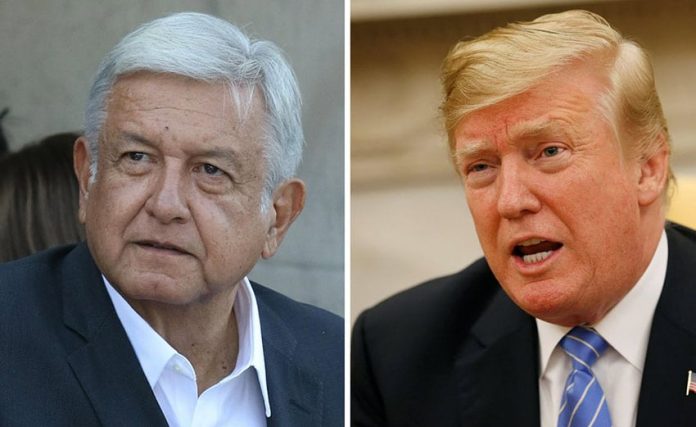A day after his historic landslide victory, president-elect Andrés Manuel López Obrador spoke to United States President Donald Trump yesterday in a conversation that touched on border security, migration and NAFTA.
“I received a call from Donald Trump and we spoke for half an hour,” the 64-year-old political veteran tweeted about 12 hours after he had addressed thousands of supporters in Mexico City’s central square.
“I proposed that we explore an integral agreement of development projects, which generate jobs in Mexico and that reduce migration and improve security. There was respectful treatment and our representatives will speak more,” López Obrador wrote.
In a later interview with broadcaster Televisa, the president-elect emphasized the close ties between the two North American nations and said he was committed to developing a strong and cooperative relationship.
“We are conscious of the need to maintain good relations with the United States. We have a border of more than 3,000 kilometers, more than 12 million Mexicans live in the United States. It is our main economic-commercial partner,” he said.
“We are not going to fight. We are always going to seek agreement . . . We are going to extend our frank hand to seek a relationship of friendship, I repeat, of cooperation with the United States.”
At the White House, Trump also spoke positively about the conversation with AMLO, as he is commonly known.
“I think he’s going to try and help us with the border,” the U.S. president told reporters.
“We had a great conversation . . . We talked about border security, we talked about trade, we talked about NAFTA, we talked about a separate deal, just Mexico and the United States,” Trump said.
“. . . I think the relationship will be a very good one, we’ll see what happens but I really do believe it’s going to be a very good one. He had a very excellent election, I would say even better than anticipated. I told him a number of years ago when I saw him campaigning for a different race . . . I said someday he’s going to be the president of Mexico so he remembered that and it turned out to be correct.”
Later in the day, López Obrador’s pick to be his foreign affairs secretary said the two men — both of whom have been described as populists and nationalists although they are on opposite sides of the political spectrum — had also agreed to meet in the near future.
Héctor Vasconcelos, whose father was secretary of education in the first elected government after the Mexican revolution, said he thought Trump and López Obrador had got on well and said the call was successful because it was “characterized by absolute mutual respect” and that there was an “atmosphere of cordiality” between the two leaders.
The seemingly positive start to their personal relationship contrasts with the currently strained bilateral relationship between Mexico and the United States that has worsened considerably since Trump took office. It has deteriorated to such an extent that many observers believe ties are at their lowest point in living memory.
Trump has frequently railed against Mexico, hitting out at the country on issues such as trade, drug trafficking and migration and repeatedly stressing that his long-proposed border wall is urgently needed.
Within that context, AMLO told supporters at a rally to launch his campaign in Ciudad Juárez earlier this year that “neither Mexico nor its people will be the piñata of any foreign government.”
He also said at a campaign rally in Oaxaca that “if Trump sends out an offensive tweet, I will take charge and answer him.”
But for now, at least, the two leaders seem intent on getting the relationship off to a good start.
Roberta Jacobson, the United States’ former ambassador to Mexico who only left the role in May, believes that López Obrador’s election could lead to improved bilateral relations between the two neighbors.
In an interview with United States broadcaster CBS as Mexicans went to the polls, Jacobson said that both López Obrador and his advisors had emphasized the importance of the Mexico-U.S. relationship to her and said that it needed to be positive.
“They’re going to work hard on that, which does not mean it’s going to be easier than it has been with the current Mexican government. I think there a number of issues on which it’s going to be difficult and maybe harder,” she said.
However, Jacobson added that AMLO “has been at pains to reassure people that he takes this relationship seriously” and that it shouldn’t “descend into insults.”
From the United States’ perspective, the former ambassador said “the most important thing that’s at stake is whether we continue to cooperate and work with Mexico as partners, whether you’re talking about economically or on trade or on migration or on security or whether that partnership we built over the last 30 years begins to deteriorate.”
During Trump’s administration, diplomacy between the United States and Mexico has increasingly been routed directly through the White House, especially via Trump’s son-in-law Jared Kushner, who has developed a close relationship with Mexican Foreign Secretary Luis Videgaray.
Jacobson said it remained to be seen how López Obrador would approach diplomatic relations with the U.S., but suggested that a return to “foreign secretary to foreign secretary” would be “much more probable.”
Source: El Universal (sp), Milenio (sp), CBS News (en)
